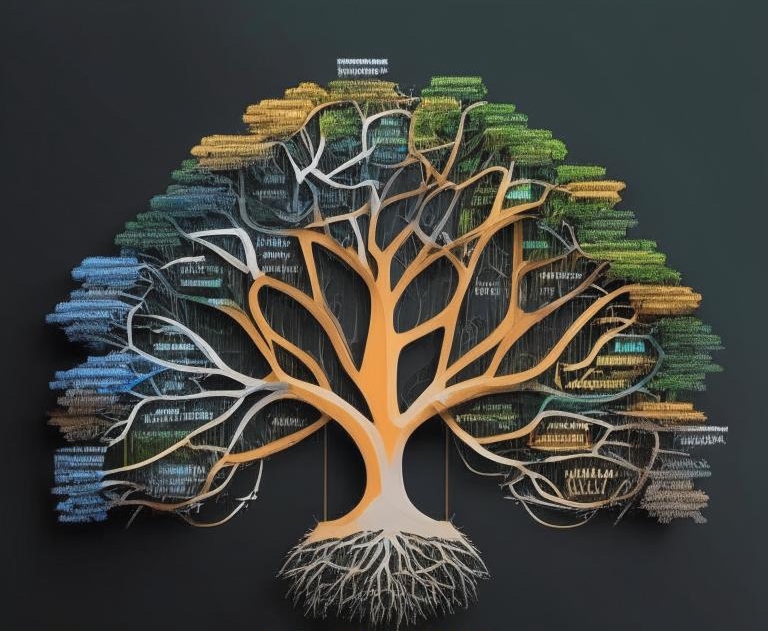The Process of Cognition
by Oleg Sovetnik
The concept of Umwelt, originally developed in biology, describes how living organisms perceive and interact with their surroundings, forming their unique view of reality. In programming, this principle can be applied to describe how systems interpret and interact with data from a subject area. Umwelt acts as a set of architectural decisions and models that define how a software system perceives and adapts to its environment.
Parallels between creating Umwelt in programming and the methodology of sociological research lie in the similar approach to working with abstract models. Like sociologists studying social processes, programmers face the need to choose a theoretical foundation that will guide their work. The choice of a fundamental theory plays a key role at the initial stage—it serves as the basis for conceptualizing complex phenomena and systems.
At the conceptualization stage, abstract ideas are transformed into specific models that represent a simplified and structured version of the studied reality. In programming, this means creating a model of the subject area that reflects key aspects of the real world. Similarly to the sociological process, programmers abstract from unnecessary details and focus on the important elements of the system.
The next stage, operationalization, involves translating concepts and models into concrete working elements. In programming, this corresponds to writing code that implements models of the subject area, enabling the system to interact with real data. This process turns abstract ideas into concrete functional tools.
The main contribution of sociology to rethinking the process of researching a subject area lies in its ability to view knowledge not as something static and independent of social context, but as the result of social interactions, networks, and structures. This changes the perspective on researching a subject area, as it becomes important not only to study the area itself but also to understand the social factors that influence its perception and interpretation.
Applying the concept of Umwelt in programming demonstrates possible paths for a more structured approach to software development, allowing the integration of various aspects of data and context into the system’s operations.
-
Common Stages
This section introduces the key parallels between processes in sociology and programming, forming the foundation for further discussions. In both disciplines, there are four main stages: fundamental theory (or programming paradigm), conceptualization (defining entities), operationalization (defining properties), and fact verification (testing in programming or empirical observation in sociology). Comparing these processes reveals how sociology and programming follow a shared structure in building and verifying models of reality. -
Choosing a Fundamental Theory
After explaining the common stages, it makes sense to move on to the first step—choosing the theoretical foundation. This section examines how fundamental theory in both sociology and programming directs subsequent steps in research or development. -
Conceptualization
Next, the conceptualization process is discussed: how abstract theoretical ideas are transformed into specific models. This shows how both sociology and programming create models that reflect the subject area. -
Operationalization
The next stage is the implementation of these models, translating them into code or measurable elements. This subsection explains how theory and concepts are transformed into concrete actions (in programming—into code). -
A New Approach
The division concludes with a description of a new approach, where the concept of Umwelt links the stages of software development to sociological research. Possible benefits of using this scheme for developing complex systems are discussed here.
sociology umwelt research cognition
Dive deeper
-
Object and Subject
The distinction between object and subject of research, their transformation in the process of scientific inquiry, and the connection to the concept of Umwelt. It shows how conceptual frameworks and subjective perceptions shape research subjects and influence the understanding of reality in different disciplines.
-
The Choice of Theory
The choice of a foundational theory in sociological research sets the framework for analysis and directs the course of the study.
-
Conceptualization
Conceptualization in sociology is a key stage in the research process, where abstract ideas and foundational theories are transformed into concrete concepts. It is the basis of both scientific knowledge and practical activity, allowing for the creation of cognitive schemas necessary for understanding and interacting with reality.
-
Operationalization
Operationalization and its impact on conceptualization, along with the need for refactoring the conceptual model when discrepancies arise between the conceptual schema and empirical data.
-
Understanding Facts
A fact is a statement about a phenomenon that is only true within the context of a specific conceptual framework and theoretical model.
-
Common Stages
A comparison of two processes—conceptualization and operationalization in sociology—and approaches to modeling a domain in programming, to understand how these approaches can enrich software engineering.
-
Umwelt in Programming
A new approach to software development based on sociological theories. It involves creating a system grounded in the concept of Umwelt.
